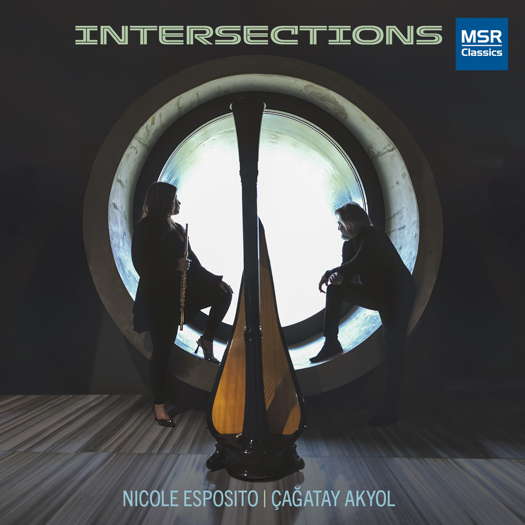 FEEDBACK: She said WHAT? Read what people think about our Classical Music Daily features, and have your say!
FEEDBACK: She said WHAT? Read what people think about our Classical Music Daily features, and have your say!
 CENTRAL ENGLAND: Mike Wheeler's concert reviews from Nottingham and Derbyshire feature high profile artists on the UK circuit - often quite early on their tours.
CENTRAL ENGLAND: Mike Wheeler's concert reviews from Nottingham and Derbyshire feature high profile artists on the UK circuit - often quite early on their tours.
 DISCUSSION: What is a work? John Dante Prevedini leads a discussion about The performing artist as co-creator, including contributions from Halida Dinova, Yekaterina Lebedeva, Béla Hartmann, David Arditti and Stephen Francis Vasta.
DISCUSSION: What is a work? John Dante Prevedini leads a discussion about The performing artist as co-creator, including contributions from Halida Dinova, Yekaterina Lebedeva, Béla Hartmann, David Arditti and Stephen Francis Vasta.

East meets West
GEOFF PEARCE enjoys music from Türkiye and its neighbouring countries
'Immediately one is struck by the sensitivity, technical proficiency and joy of these two performers, flautist Nicole Esposito and harpist Çağatay Akyol.'
This lovely disc, Intersections, from MSR Classics, is most welcome. It contains little known works for flute and harp - some are transcriptions - from composers that inhabit the areas that are a confluence of East meets West. This album contains charming music which is beautifully performed and a delight to the ear. The programme notes are also sufficiently informative.
The first work on the disc is a three-movement sonata for flute and harp by Adrian Shaposhnikov (1888-1967). It is a delightfully sumptuous, impressionistic work that owes much to folk melodies of the region. Immediately one is struck by the sensitivity, technical proficiency and joy of these two performers, flautist Nicole Esposito and harpist Çağatay Akyol.
Listen — Adrian Shaposhnikov: Andante con moto (Sonata for Flute and Harp)
(MS 1843 track 1, 3:05-3:48) ℗ 2023 Nicole Esposito :
The second work, by Kemal Günüç (born 1961), is Anatolian Colors – Four Small Pieces for Flute and Harp. Written especially for this recording, these pieces exploit rhythmic and melodic elements from the folk songs of Anatolia's seven regions. They are, again, lovely evocative pieces that showcase the gorgeous sounds of these two artists.
Listen — Kemal Günüç: 7/8 (Anatolian Colors)
(MS 1843 track 5, 0:01-0:34) ℗ 2023 Nicole Esposito :
Next come 6 Stücke für Flöte und Klavier (1978) by Azerbaijani composer Fikret Amirov (1922-1984). Of all the composers on this disc, this is the one with whom I am mostly familiar. These works have been arranged by the two performers on this recording. The composer's style combines both Azerbaijani folk music with music from Russian and other Western traditions, and this is very evident in these six short pieces. Each movement has a descriptive title.
Listen — Fikret Amirov: In the Mountains of Azerbaijan
(6 Stücke für Flöte und Klavier)
(MS 1843 track 11, 0:01-0:45) ℗ 2023 Nicole Esposito :
The style and approach of Armenian composer Arno Babadjanian (1921-1983) is similar to that of the previous composer, and this little piece, Melody, arranged by the two performers, is filled with such tenderness and poignancy. I could imagine this being set to words and sung by Charles Aznavour.
Listen — Arno Babadjanian: Melody
(MS 1843 track 14, 1:05-1:51) ℗ 2023 Nicole Esposito :
The longest work here, of about twenty-five minutes, is 10 Pieces for Flute and Piano by Assen Karastoyanov (1893-1976). As the notes say, these pieces (also arranged by the performers) rely heavily on the Bulgarian folk tradition, and there are some nice contrasting styles. The composer was also a flautist, a multi-faceted musician and an ethnographer of Bulgarian folk music. These pieces, evocative of Bulgarian village life, have been published in a few different forms.
Listen — Assen Karastoyanov: Daytchka (10 Pieces for Flute and Piano)
(MS 1843 track 24, 0:01-0:55) ℗ 2023 Nicole Esposito :
The final work here is Three Old Istanbul Songs by Santuri Etham Bey (1855-1926). The first and third songs are 'Longas', a type of Turkish song which is thought to have Romanian origins, whilst the middle song, 'Katibim', is an anonymous song that has been very popularly transcribed many times for various forces. The arranger of these songs here is Çağatay Akyol, the harpist on this recording.
Listen — Santuri Etham Bey: Katibim (Three Old Istanbul Songs)
(MS 1843 track 26, 0:43-1:31) ℗ 2023 Nicole Esposito :
This is a very interesting disc, comprising works inspired by folk music from a very fascinating part of the world. The performers are very accomplished, both for their playing, but also for the arrangements.
Listen — Santuri Etham Bey: Şehnaz Longa (Three Old Istanbul Songs)
(MS 1843 track 25, 0:18-1:10) ℗ 2023 Nicole Esposito :
The combination of flute and harp could easily become a bit limited after a while, but it doesn't here as the music has plenty of variation in style and mood to keep the interest level. I think that most listeners will enjoy these pieces.
Copyright © 13 October 2023
Geoff Pearce,
Sydney, Australia



